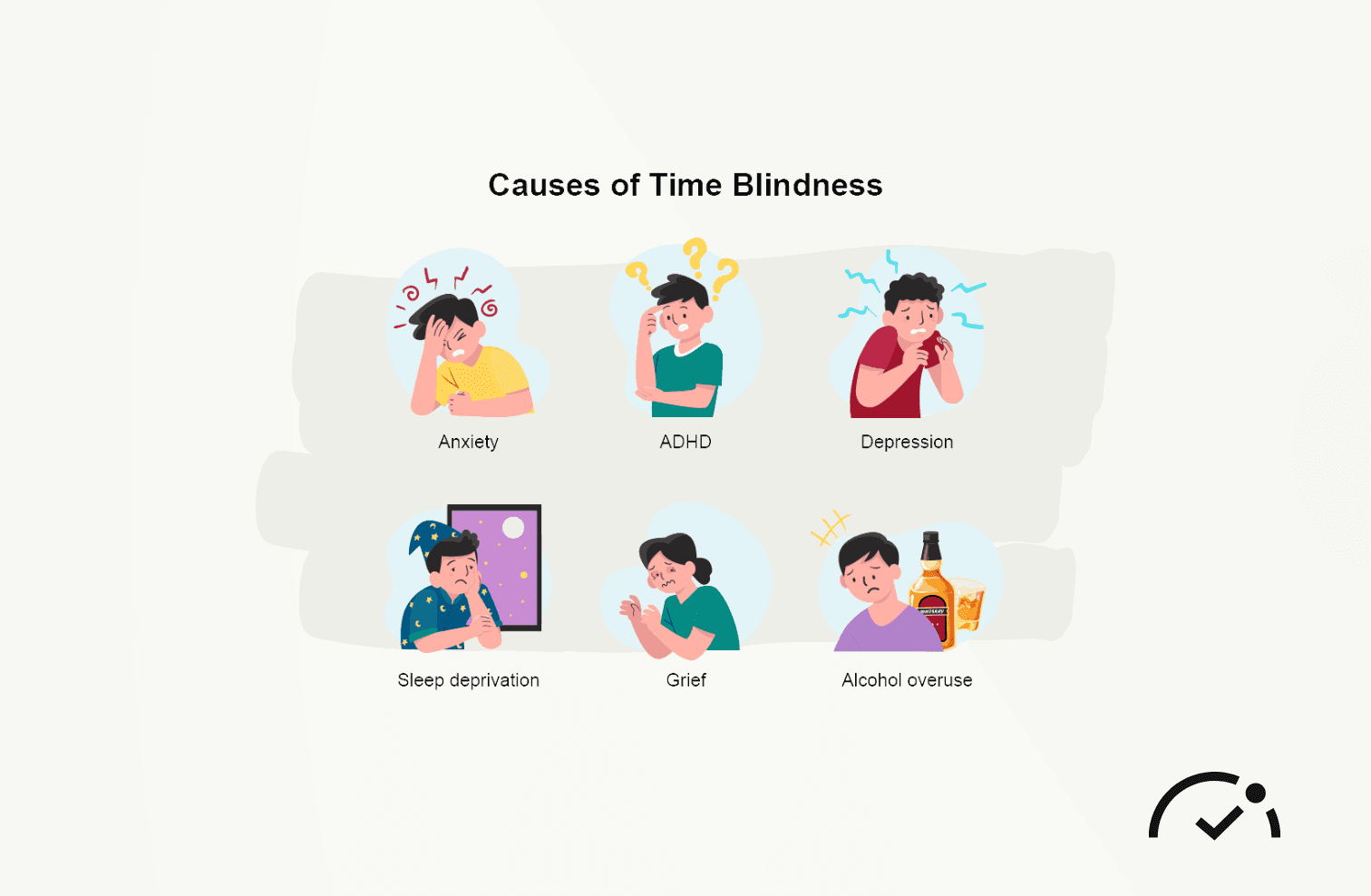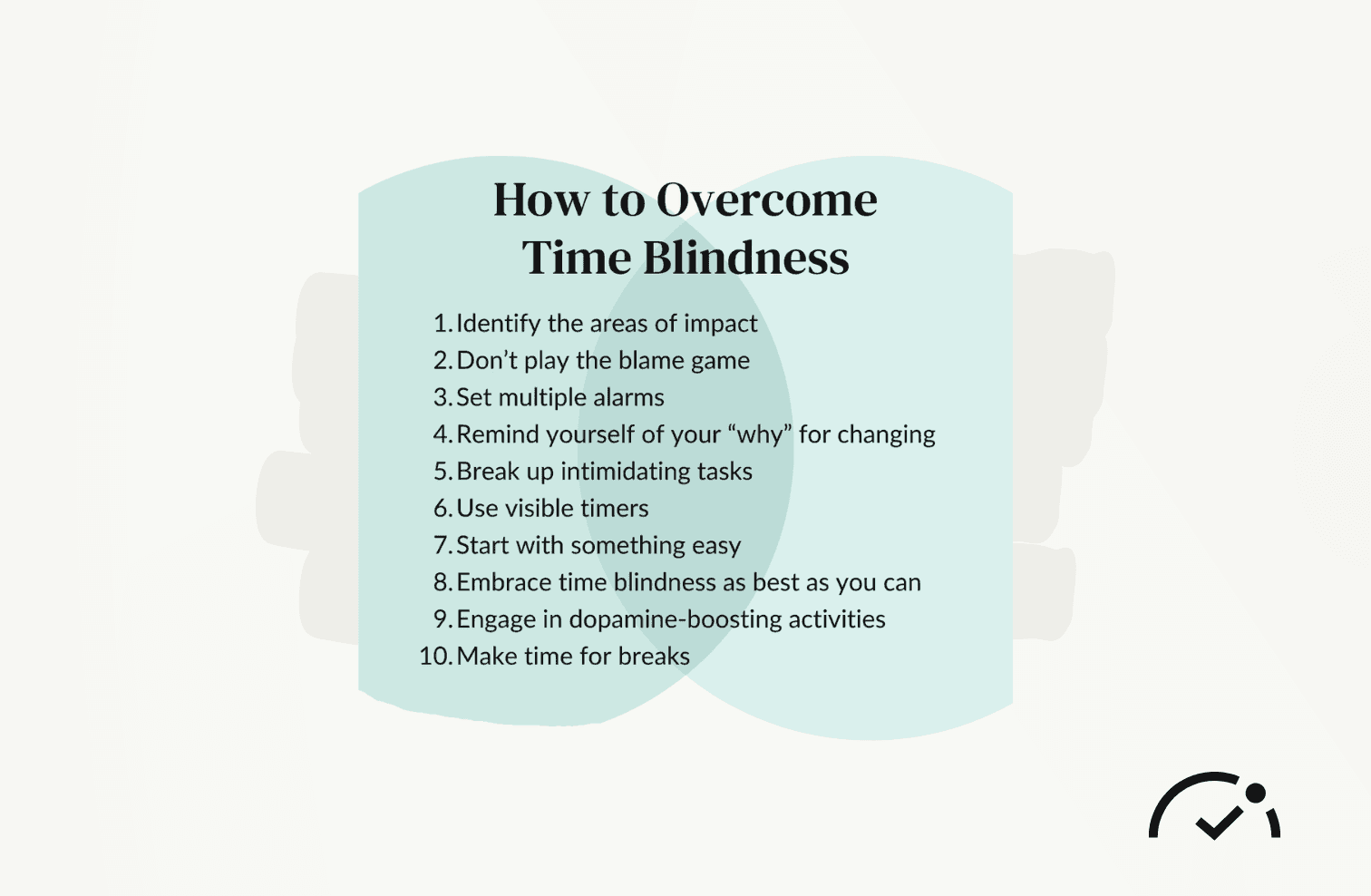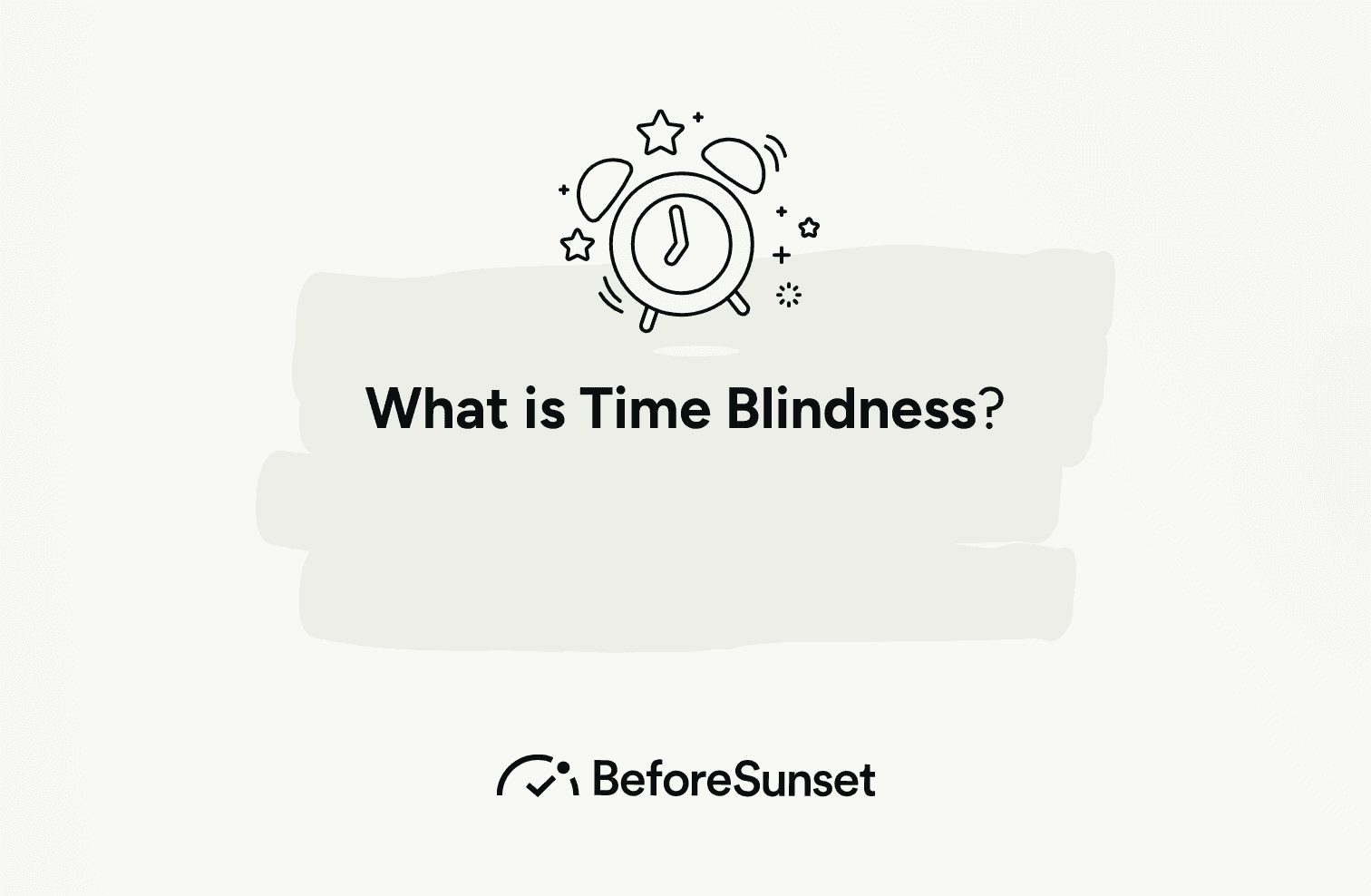Ever lose yourself in a good book and realize hours have flown by? That's a normal experience. But for some people, difficulty keeping track of time, or time blindness, is a chronic challenge that impacts daily life.
Time blindness refers to the inability to accurately perceive the passage of time. People with time blindness struggle to estimate how long tasks take, sense how much time has passed, and sequence events chronologically. This can lead to a distorted perception of time, making them feel constantly rushed or behind schedule.
While not a formal medical condition, time blindness is often associated with mental health conditions like ADHD and autism spectrum disorder (ASD). It can also be a symptom of other conditions affecting the brain.
You might also like:

Symptoms of Time Blindness:
Underestimating or overestimating how long tasks will take or how much time has passed.
Chronic lateness or difficulty meeting deadlines.
Poor time management and difficulty sticking to schedules.
Hyperfocusing on activities, leading to a loss of track of time.
Difficulty with time sequencing and organizing events chronologically.
Impact on Daily Life:
Time blindness can significantly impact a person's quality of life. It can lead to stress, anxiety, and difficulty managing work, school, and personal relationships.
Improving Your Sense of Time:
Several strategies can help those struggling with time blindness.
Visual timers: Using timers with visual cues, like a sand timer or progress bar, can provide a more concrete sense of time passing.
Time logs: Keeping track of daily activities can help identify areas where time perception is skewed.
Buffer time: Schedule extra time into your day to account for unexpected delays or underestimating tasks.
Digital clocks: Keep visible digital clocks around the house or workplace as a constant reminder of the time.
Behavioral therapy: Cognitive-behavioral therapy (CBT) can help develop strategies for time management and improve internal clocks.

Understanding the Cause:
If you suspect time blindness is affecting your daily life, consulting a healthcare professional is crucial. They can help identify any underlying medical conditions and recommend appropriate treatment options. Understanding the cause of your time blindness, whether due to a mental health condition, neurological issue, or even dopamine levels, can guide treatment plans.
By incorporating these strategies and seeking professional help if needed, you can improve your sense of time and take control of your daily schedule. Remember, you're not alone! With a little effort, you can overcome the challenges of time blindness and live a more fulfilling life.
How Your Work Environment Can Impact Time Blindness
While certain aspects can exacerbate the issue, others can offer surprising support. Here's how your workplace can influence your experience with time blindness:
The Open Office Labyrinth:
Open office plans, a popular modern design, can be a nightmare for those with time blindness. Constant distractions and background noise make it difficult to focus and maintain a sense of time. Consider noise-canceling headphones or requesting a more private workspace to minimize disruptions.
The Tyranny of Constant Interruptions:
Unannounced meetings, quick questions from colleagues, and overflowing inboxes can all derail your carefully planned schedule. Advocate for designated "focus time" where you can work uninterrupted or set clear boundaries with colleagues about communication styles.
The Visual Overload:
Cluttered desks and overflowing inboxes can contribute to a feeling of overwhelm and make it harder to prioritize tasks. Implement a minimalist workspace with a to-do list app or planner to keep your visual environment organized and promote a sense of calm.
The Power of Natural Light:
Studies show natural light can improve mood and focus. If possible, position yourself near a window or advocate for increased natural light in your workspace. This can boost your energy levels and help you stay on track throughout the day.
The Unexpected Ally: Deadlines:
While deadlines can be stressful, they can also provide a much-needed external structure for those with time blindness. Use deadlines to your advantage by breaking down larger projects into smaller, more manageable tasks with clear due dates.
Communication is Key:
Open communication with your manager and colleagues is crucial. Explain your challenges with time blindness and discuss strategies that can help you succeed, such as flexible schedules or buffer time between meetings.
Strategies to Improve Time Blindness
Does time ever feel like it's on fast-forward for you? This phenomenon, often referred to as "blindness at times," or more formally, time perception deficit, can be a core symptom of various mental disorders and significantly impact everyday life.
Understanding Time Blindness:
Time perception deficit isn't about not knowing how to read a clock. It's a struggle with internal timekeeping, making it difficult to gauge how long tasks take and how much time has passed. This can lead to a chaotic daily routine, missed deadlines, and increased stress.
The Impact on Everyday Life:
People with time blindness often experience challenges with:
Everyday tasks: Simple things like grocery shopping or getting ready in morning can become unexpectedly time-consuming.
Level of activity: Difficulty pacing oneself can lead to exhaustion or feeling overwhelmed.
Single-tasking: The urge to multitask can exacerbate time blindness, making it harder to focus on a single activity.
The Roots of the Problem:
The causes of time perception deficit can vary. Brain chemistry, mental health conditions like ADHD, and even a lack of sleep can contribute. For children, their time processing skills are still developing, leading to a naturally different perception in adults compared to adults. Additionally, impulsive decisions often associated with certain mental disorders can further disrupt time management.
Taking Back Control:
Fortunately, there are strategies to manage time blindness and improve your relationship with the clock:
Mental health treatment: If an underlying mental disorder is suspected, seeking professional help is crucial.
5-minute breaks: Schedule short breaks throughout the day to prevent hyperfocus and maintain a sense of time.
Content-accurate to-do lists: Break down large projects into smaller, more manageable tasks with realistic timeframes.
Visual aids: Use timers, calendars, and planners to create a visual representation of your schedule.
Focus on the present: Mindfulness techniques can help you stay grounded in the present moment and avoid getting lost in future worries.
Healthy sleep habits: Prioritize good sleep hygiene to ensure your brain is functioning optimally.
It's a Journey, Not a Destination:
Improving time blindness takes time and effort. Be patient with yourself, celebrate your successes, and don't be afraid to adjust your strategies as needed. If you're struggling, consult a healthcare provider to discuss personalized solutions and explore treatment options. Remember, managing time blindness is possible. By understanding your perception of time, including both time perspectives and time discrimination, addressing underlying causes, and implementing effective strategies, you can regain control of your schedule and live a more fulfilling life.
Struggling with Time Blindness? BeforeSunset AI Can Be Your New Best Friend
If you suspect you might have time blindness, you're not alone. This challenge with internal timekeeping can wreak havoc on your productivity and overall well-being.
But fear not! BeforeSunset AI is a mindful productivity tool designed to empower individuals, and that includes those struggling with time blindness. Here's how BeforeSunset AI can be your new best friend in the battle against the clock:
Structure and Time Blocking:
BeforeSunset AI offers time-blocking, a technique that breaks down your day into focused blocks dedicated to specific tasks. Whether you choose to work with the AI assistant or build your schedule manually, time blocking creates a clear structure and combats the feeling of time slipping away.
Track Your Time (Without Feeling Trapped):
Time blindness can make it difficult to accurately estimate how long tasks take. BeforeSunset AI's time-tracking feature allows you to monitor your progress without the pressure of constant monitoring. Analyzing how much time you spend on tasks can be a real eye-opener and help you adjust your schedule for better time management in the future.
Personalized Insights and Analytics:
Feeling lost in a sea of data? BeforeSunset AI's Personal Analytics screen cuts through the noise. By analyzing your productivity data, it provides valuable insights that help you understand your work patterns and identify areas for improvement. This self-awareness is crucial for overcoming time blindness and becoming a better planner.
AI Assistant: Your Schedule Guru:
The AI assistant in BeforeSunset AI can be your scheduling savior. It can automatically plan your day, break down tasks into actionable steps, and even create subtasks. This frees up your mental space and allows you to focus on actually getting things done.
Sync Your Calendar and To-Do List:
Juggling multiple calendars and to-do lists can be a recipe for disaster for someone with time blindness. BeforeSunset AI integrates seamlessly with both Google Calendar and Outlook, eliminating the need to constantly switch between apps and ensuring all your commitments are in one place.
Prioritization Made Easy:
Not all tasks are created equal. BeforeSunset AI allows you to prioritize your to-do list with clear tags. This visual cue helps you identify urgent tasks and ensures the AI assistant crafts a schedule that reflects your most pressing needs.
BeforeSunset AI recognizes that productivity isn't a one-size-fits-all approach. With its focus on mindful planning and personalized insights, it empowers individuals with time blindness to take control of their schedules and achieve their goals. So, ditch the feeling of being constantly behind and give BeforeSunset AI a try. You might just be surprised at how much you can accomplish!


